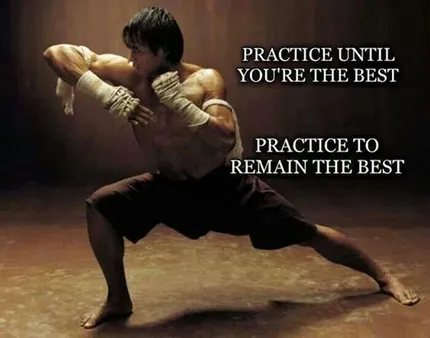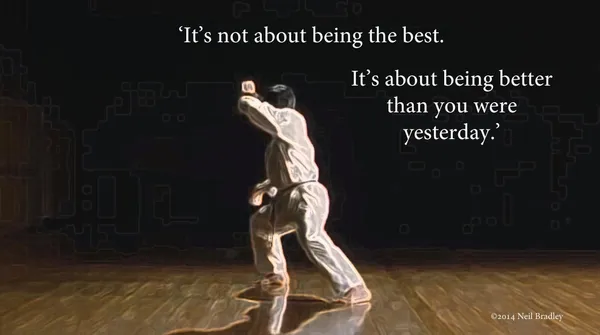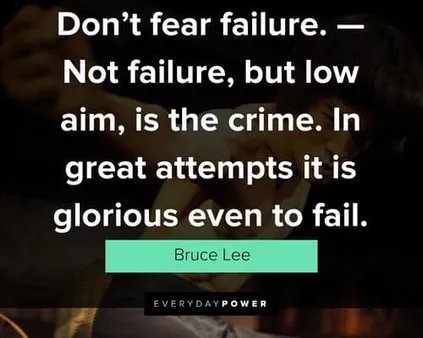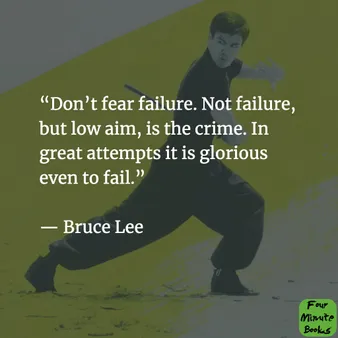Table of Contents
Welcome to Kizworld, your trusted source for martial arts wisdom and inspiration. Throughout history, martial artists have shared profound insights and philosophies through powerful quotes and sayings. These words capture the essence of this ancient discipline, offering valuable lessons for personal growth, self-improvement, and the pursuit of excellence. Join us as we delve into The best martial arts quotes and sayings, exploring their significance and how they can be applied to everyday life. From the wisdom of ancient warriors to the teachings of modern-day masters, these quotes will ignite your motivation, inspire greatness, and guide you on your martial arts journey and beyond.
The Best Martial Arts Quotes and Sayings to Inspire Your Inner Warrior
I. The Essence of Martial Arts Philosophy: Embracing Harmony
The Essence of Martial Arts Philosophy: Embracing Harmony
At the heart of martial arts lies a profound philosophy that extends beyond physical techniques and combat skills. It is a way of life that emphasizes harmony, balance, and self-improvement, guiding practitioners on a journey of personal growth and transformation. This philosophy permeates every aspect of martial arts training, from the way students bow to their instructors to the way they interact with fellow practitioners.
One of the core principles of martial arts philosophy is the pursuit of inner peace and harmony. This is not simply about avoiding conflict, but rather about cultivating a state of mental and emotional balance that allows one to respond to challenges with clarity and composure. Harmony is achieved through the cultivation of virtues such as patience, humility, and respect, which are essential for creating a positive and supportive training environment.
Principle | Description |
Inner Peace and Harmony | Cultivating a state of mental and emotional balance. |
Pursuit of Excellence | Continuously striving to improve skills and knowledge. |
Respect and Humility | Showing deference to instructors and fellow practitioners. |
Self-Discipline and Perseverance | Maintaining focus and determination in the face of challenges. |
Unity of Mind and Body | Integrating physical and mental aspects of training. |
Another important aspect of martial arts philosophy is the pursuit of excellence. This is not about achieving perfection, but rather about continually striving to improve one's skills and knowledge, both physically and mentally. Martial artists are encouraged to push their limits, to learn from their mistakes, and to never give up on their journey of self-improvement. This relentless pursuit of excellence extends beyond the dojo and into all aspects of life, inspiring practitioners to set high standards for themselves and to不断努力实现目标.
Respect and humility are also fundamental to martial arts philosophy. Students are taught to show deference to their instructors and fellow practitioners, regardless of their rank or experience. This creates a culture of mutual respect and support, where everyone can learn and grow together. Humility is also essential, as it prevents martial artists from becoming arrogant or overconfident. They are constantly reminded that there is always more to learn and that they should never take their skills for granted.
Finally, martial arts philosophy emphasizes the importance of self-discipline and perseverance. Martial artists are expected to maintain focus and determination in the face of challenges, both inside and outside the dojo. They are taught to overcome obstacles, to never give up on their goals, and to始终坚持到底. This mental and emotional strength is what sets martial artists apart and allows them to achieve great things in all areas of their lives.
In conclusion, the essence of martial arts philosophy lies in the pursuit of harmony, excellence, respect, humility, self-discipline, and perseverance. These principles are woven into the fabric of martial arts training and guide practitioners on a journey of personal growth and transformation. Whether one is training for self-defense, physical fitness, or simply for the love of the art, embracing martial arts philosophy can lead to a more fulfilling and meaningful life.
For more information on the philosophy and history of martial arts, check out our articles on The History and Philosophy of Martial Arts and The Most Common Martial Arts Injuries and How to Treat Them.
II. Legends & Luminaries: Wisdom and Words that Inspire
In the realm of martial arts, countless masters, warriors, and philosophers have left behind profound words and teachings that continue to inspire practitioners and enthusiasts today. These quotes offer a glimpse into the depth of their understanding and the philosophies that shaped their martial arts journey.
One of the most influential figures in the history of martial arts is Bruce Lee. A renowned martial artist, actor, and philosopher, Lee's words and teachings have had a lasting impact on the world. In his book "Tao of Jeet Kune Do," Lee wrote, "The highest technique is to have no technique."
Quote: | "The highest technique is to have no technique." |
|---|---|
Author: | Bruce Lee |
Significance: | This quote emphasizes the importance of adaptability and fluidity in martial arts. It suggests that the best martial artist is one who can respond to any situation without being constrained by rigid techniques. |
Another iconic martial artist and philosopher, Miyamoto Musashi, wrote the book "The Book of Five Rings." In this book, he shared his insights on strategy, tactics, and the mental aspects of combat. Musashi's teachings are still studied and applied by martial artists today.
These are just a few examples of the many martial arts legends and luminaries who have shared their wisdom and teachings with the world. Their words continue to inspire and motivate practitioners and enthusiasts, helping them on their martial arts journey and in their quest for personal growth and self-improvement.
Legends and Luminaries: A List of Influential Martial Artists and Philosophers
- Bruce Lee (1940-1973) - Chinese-American martial artist, actor, and philosopher, founder of Jeet Kune Do.
- Miyamoto Musashi (1584-1645) - Japanese swordsman, philosopher, and strategist.
- Gichin Funakoshi (1868-1957) - Okinawan martial artist and founder of Shotokan karate.
- Morihei Ueshiba (1883-1969) - Japanese martial artist and founder of Aikido.
- Ip Man (1893-1972) - Chinese martial artist and founder of Wing Chun.
These martial arts legends and luminaries have left behind a wealth of wisdom and teachings that continue to inspire and guide practitioners and enthusiasts today. Their words offer valuable lessons for personal growth, self-improvement, and the pursuit of excellence.
III. Practical Adages for Unstoppable Martial Artists
Practical Adages for Unstoppable Martial Artists
In the realm of martial arts, the path to mastery is paved with practical adages that guide practitioners toward excellence. These timeless wisdoms, passed down through generations of martial artists, offer invaluable insights into the physical, mental, and spiritual aspects of the discipline.
One such adage emphasizes the importance of embracing challenges:Wise warriors say, "The greatest glory in living lies not in never falling, but in rising every time we fall." This profound statement reminds us that setbacks and failures are inevitable, but it is our unwavering determination to learn from our mistakes and persevere that truly defines our character. Just as a skilled martial artist learns from each defeat, we too must embrace challenges as opportunities for growth and improvement.
Another adage highlights the importance of self-awareness:Grandmasters often say, "Knowing others is intelligence; knowing yourself is true wisdom. Mastering others is strength; mastering yourself is true power." In the pursuit of martial arts mastery, self-awareness is paramount. By understanding our strengths, weaknesses, and limitations, we can identify areas for improvement and develop a targeted training regimen. Furthermore, self-awareness allows us to remain grounded and humble, even in the face of success.
- Embrace Challenges: See setbacks as opportunities for growth.
- Cultivate Self-Awareness: Understand your strengths and weaknesses.
Another valuable adage emphasizes the importance of remaining adaptable:“One who is too stiff and inflexible shall be broken. One who is too soft and yielding shall be crushed. Be like water that adapts to any container.” In the ever-changing landscape of martial arts, adaptability is key. Just as water can flow around obstacles and take the shape of any vessel, martial artists must be able to adapt their techniques and strategies to overcome any challenge. This means being open to new ideas, experimenting with different approaches, and constantly evolving our skills.
Finally, one of the most profound adages in martial arts underscores the importance of persevering through adversity:“The greatest test of courage on earth is to bear defeat without losing heart.” The path to martial arts mastery is not without its hurdles. There will be times when we face setbacks, experience failures, and encounter seemingly insurmountable obstacles. However, true martial artists do not succumb to despair. Instead, they draw upon their inner strength, remain resolute in their pursuit, and ultimately triumph over adversity.
Adage | Meaning |
|---|---|
Embrace Challenges | See setbacks as opportunities for growth. |
Cultivate Self-Awareness | Understand your strengths and weaknesses. |
Remain Adaptable | Be open to new ideas and constantly evolve your skills. |
Persevere Through Adversity | Do not succumb to despair, draw upon inner strength, and triumph over obstacles. |
These practical adages offer a glimpse into the wisdom and insights that have shaped the world of martial arts for centuries. By embracing these principles, martial artists can cultivate the physical, mental, and spiritual attributes necessary to achieve mastery and live a life of purpose and fulfillment.
IV. Martial Arts Fundamentals: Strength, Balance, and Harmony
Martial Arts Fundamentals: Strength, Balance, and Harmony
In the realm of martial arts, strength, balance, and harmony are the cornerstones of effective technique and successful practice. These fundamental elements are intricately intertwined, forming a foundation that supports all aspects of martial arts training and application. Strength provides the physical power necessary to execute techniques with precision and force, while balance ensures stability and agility in movement. Harmony, the seamless integration of mind, body, and spirit, brings these elements together, creating a state of flow and effortless action.
Developing strength in martial arts goes beyond mere muscular power. It encompasses the cultivation of internal strength, known as "ki" or "chi," which is the life force energy that flows through the body. This internal strength is harnessed and directed through proper breathing techniques, meditation, and specific exercises, enhancing overall physical performance and combat effectiveness.
Balance is another crucial aspect of martial arts. It involves maintaining equilibrium and stability while executing techniques, transitioning between movements, and adapting to an opponent's attacks. Good balance allows martial artists to remain centered, grounded, and responsive, enabling them to react quickly and effectively to changing situations.
Harmony, the ultimate goal of martial arts training, is achieved when strength and balance are combined with mental focus, emotional control, and spiritual awareness. This state of harmony allows martial artists to transcend the limitations of the physical body and access a higher level of consciousness, where actions become effortless and intuitive.
To cultivate strength, balance, and harmony in martial arts, practitioners engage in a variety of training methods, including:
- Strength training: This includes exercises that develop muscular strength, power, and endurance, such as weightlifting, calisthenics, and plyometrics.
- Balance training: This involves exercises that challenge balance and proprioception, such as standing on one leg, walking on uneven surfaces, and performing yoga or tai chi.
- Meditation and breathing exercises: These practices help to cultivate internal strength, focus the mind, and promote relaxation, which are essential for achieving harmony.
By diligently practicing these fundamental elements, martial artists can develop a strong foundation that supports their technical skills, enhances their combat effectiveness, and ultimately leads them towards the path of mastery.
Strength | Balance | Harmony |
Increased power and precision in techniques | Improved stability and agility | Enhanced mental focus and emotional control |
Reduced risk of injury | Better coordination and reaction time | Greater awareness and presence |
Improved overall physical performance | Enhanced adaptability to changing situations | A deeper connection to the art and its principles |
"Strength, balance, and harmony are the three pillars of martial arts. Without them, it is impossible to achieve true mastery." - Grandmaster Choa Kok Sui
The pursuit of strength, balance, and harmony in martial arts is a lifelong journey. It requires dedication, perseverance, and a willingness to embrace the challenges that arise along the way. However, the rewards are immense, not only in terms of physical prowess and combat effectiveness, but also in terms of personal growth, self-awareness, and spiritual development.
Whether you are a seasoned martial artist or just starting your journey, remember that these fundamental elements are the foundation upon which all else is built. By cultivating strength, balance, and harmony, you will unlock your full potential and experience the true essence of martial arts.
Related posts:
- How to Improve Your Speed, Power, and Agility with Martial Arts
- The Best Martial Arts Exercises and Drills
- How to Learn the Basic Martial Arts Skills and Techniques
V. Conclusion
The best martial arts quotes and sayings are more than just words; they are vessels of wisdom and inspiration, passed down through generations of practitioners. They encapsulate the essence of martial arts, offering guidance, motivation, and practical lessons that can be applied to all aspects of life. These quotes remind us that martial arts is not just about physical techniques but also about developing mental fortitude, discipline, and a deep understanding of ourselves and the world around us. As we continue to explore and appreciate the rich tapestry of martial arts quotes and sayings, let us carry their wisdom with us, allowing them to inspire and guide our actions, both on and off the mat.